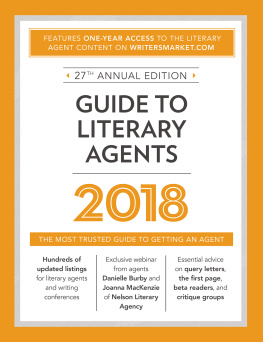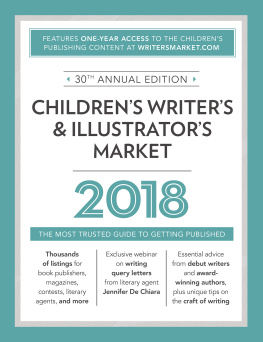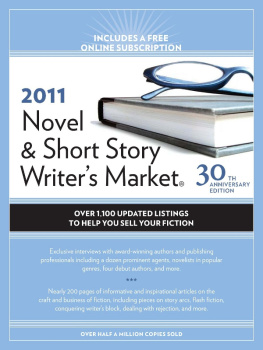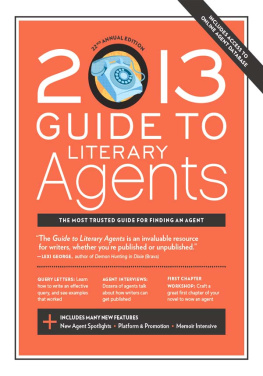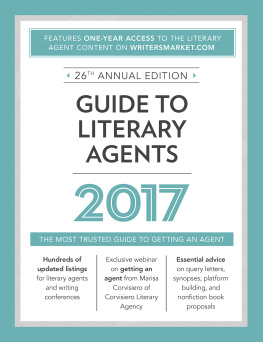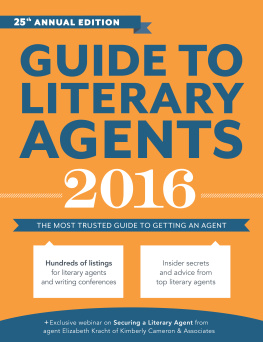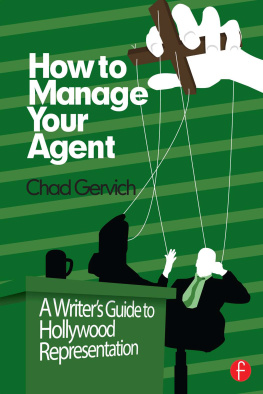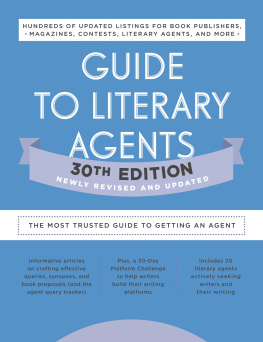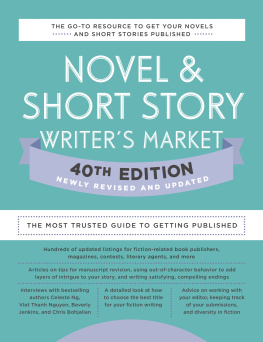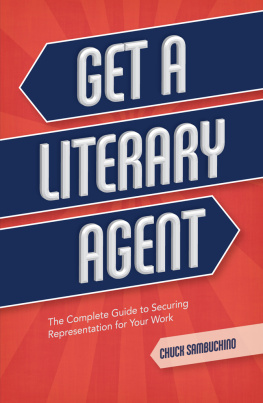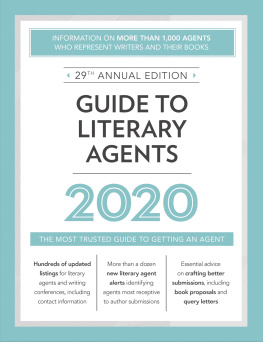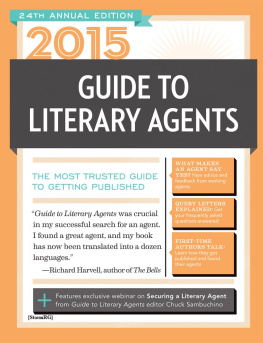Contents
Guide
GUIDE TO
LITERARY
AGENTS
2018
27TH ANNUAL EDITION
Cris Freese, Editor

WritersDigest. com
Cincinnati, Ohio
CONTENTS
FROM THE EDITOR

PHOTO: Al Parrish
When I first took over the role of editor of Guide to Literary Agents (both in print and online), I was overwhelmed by the enormous amount of information available to writers. I sought to determine the following: What does a writer absolutely need to know to get an agent, and get published? I settled on these things: A writer must know how to write a query letter and a synopsis, and if he is writing nonfiction, he must know how to write a book proposal.
But thats simple. Everyone knows that. And this information has been in this book for years. So I pushed further. First, a writer must write something worthwhile. So I included literary agent Paula Muniers wonderful piece on crafting the perfect first page. And I thought about editing, and the importance of conferences and critique groups. All of these items felt like necessary skillsor toolsfor writers.
So I added a brand-new section to this book, The Writers Toolbox. This section includes articles on the above information, along with a fantastic piece on the online opportunities for writers through hashtags and Twitter.
And to round out this new section, I added a genre specific roundtable from four fantastic agents on todays science fiction and fantasy market. But, if youre not interested in these genres, Ive culled together a bevy of genre information for you online at writersdigest.com/GLA-18. Please check out this new feature, as Ive highlighted other online articles throughout this book that can be of use for you.
When youre finished pouring over these articles, get ready for the listings and the New Agent Spotlights, packed with new agents who are actively building their client lists. Nows the time to begin your researchwthese agents are ready.
I hope youll find this resource as fun and useful as I have in compiling it. Please stay in touch at my blogwww.guidetoliteraryagents.com/blogand on Twitter (@CrisFreese). And be sure to check out the fantastic new webinar on gettting an agent at www.writersmarket.com/2018-gla-webinar.
Cris Freese
Managing Editor, Writers Digest Books & Writers Market Series
GETTING STARTED
HOW TO USE GUIDE TO LITERARY AGENTS
Searching for a literary agent can be overwhelming, whether youve just finished your first book or you have several publishing credits on your rsum. More than likely, youre eager to start pursuing agents and anxious to see your name on the spine of a book. But before you go directly to the listings in this book, take time to familiarize yourself with the way agents work and how you should approach them. By doing so, you will be more prepared for your search and ultimately save yourself effort and unnecessary angst.
READ THE ARTICLES
This book begins with feature articles organized into three sections: Getting Started, Contacting Agents, and The Writers Toolbox. These articles explain how to prepare for representation, offer strategies for contacting agents, and arm you with vital tools in your journey. You may want to start by reading through each one and then refer back to relevant articles during each stage of your search.
Because there are many ways to make that initial contact with an agent, weve also provided an article called Debut Authors Tell All. These personal accounts from just-published authors offer information and inspiration for any writer hoping to find representation.
DECIDE WHAT YOURE LOOKING FOR
A literary agent will present your work directly to editors or producers. Its the agents job to get her clients work published or sold, and to negotiate a fair contract. In the Literary Agents listings section, we list each agents contact information and explain both what type of work the agency represents and how to submit your work for consideration.
For face-to-face contact, many writers prefer to meet agents at conferences. By doing so, writers can assess an agents personality, attend workshops, and have the chance to get more feedback on their work than they get by mailing or e-mailing submissions and waiting for a response. The Conferences section lists conferences agents and/or editors attend. In many cases, private consultations are available, and agents attend with the hope of finding new clients to represent.
UTILIZE THE EXTRAS
Aside from the articles and listings, this book offers a section of Resources. If you come across a term with which you arent familiar, check out the Resources section for a quick explanation. Also, note the gray tabs along the edge of each page. The tabs identify each section so they are easier to flip to as you conduct your search.
Finallyand perhaps most importantlythere are the Indexes in the back of the book. These can serve as an incredibly helpful way to start your search because they categorize the listings according to different criteria. For example, you can look for literary agents according to their specialties (fiction/nonfiction genres).
LISTING POLICY AND COMPLAINT PROCEDURE
Listings in Guide to Literary Agents were originally compiled from detailed questionnaires and information provided by agents. However, the publishing industry is constantly in flux, and agencies change frequently. We rely on our readers for information about their dealings with agents, as well as changes in policies or fees that differ from what has been reported to the editor of this book. Write to the editor (Guide to Literary Agents, F+W, 10151 Carver Road, Suite 200, Cincinnati, OH 45242) or e-mail () if you have new information, questions, or problems dealing with the agencies listed.
Listings are published free of charge and are not advertisements. Although the information is as accurate as possible, the listings are not endorsements or guarantees by the editor or publisher of Guide to Literary Agents. If you feel you have not been treated fairly by an agent or representative listed in Guide to Literary Agents, we advise you to take the following steps:
- First try to contact the agency. Sometimes one letter or e-mail can clear up the matter. Politely relate your concern.
- Document all your correspondence with the agency. When you write to us with a complaint, provide the name of your manuscript, the date of your first contact with the agency, and the nature of your subsequent correspondence.
- We will keep your letter on file and attempt to contact the agency. The number, frequency, and severity of complaints will be considered when we decide whether or not to delete an agencys listing from the next edition.
NOTE: Guide to Literary Agents reserves the right to exclude any agency for any reason.
FREQUENTLY ASKED QUESTIONS
- Why do you include agents who are not seeking new clients? Some agents ask that their listings indicate they are currently closed to new clients. We include them so writers know the agents exist and know not to contact them at this time.

